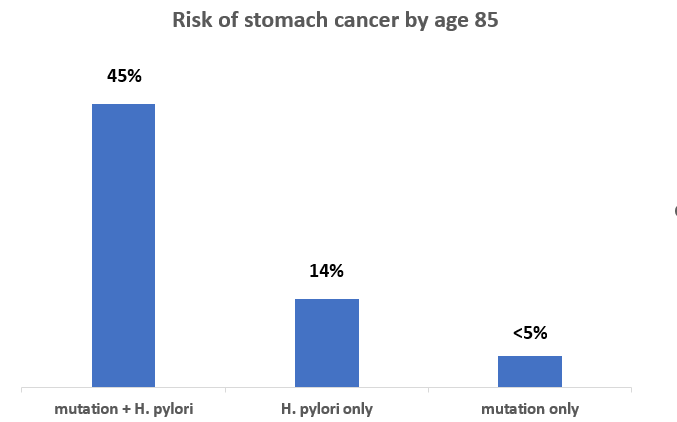Study: H. pylori bacteria infection and risk of stomach cancer in mutation carriers
The results of a study in Japan show that people with a bacterial infection called H. pylori and an inherited mutation in an ATM, BRCA1, BRCA2 or PALB2 gene have a high risk of stomach cancer. (Posted 1/19/24)
Este artículo está disponible en español.

RELEVANCE
Most relevant for: People who are at increased risk for stomach cancer due to an inherited mutation..
It may also be relevant for:
- people with a genetic mutation linked to cancer risk
- people with a family history of cancer
- previvors


Relevance: Medium-High


Strength of Science: Medium-High


Research Timeline: Post Approval
What is this study about?
Researchers wanted to understand how a person’s risk of stomach cancer changes when two types of risk factors are present:
- an that increases cancer risk
- an infection with a bacteria called H. pylori
Why is this study important?
Stomach cancer is the fifth most common cancer worldwide. Rates of stomach cancer vary by region, with the highest rates in East Asia, South America, Central America and Eastern Europe.
Environmental, dietary and hereditary factors affect a person’s lifetime risk for developing stomach cancer. Some past studies have shown a link between inherited mutations in and and stomach cancer risk, but the amount of this risk remains uncertain.
One risk factor for stomach cancer is an infection caused by H. pylori (Helicobacter Pylori), a type of bacteria that attacks the lining of the stomach. Most H pylori infections occur in childhood (when fecal to oral routes of infection are more likely) and new infections are less common in adults.
People with H. pylori infection often do not have any symptoms, but some may experience inflammation of the stomach and ulcers. Although not common, long-term infection can lead to stomach cancer.
Doctors can do a stool or a breath test to look for H pylori. People might also be checked for H pylori during endoscopy (for example during pancreatic cancer screening). If H pylori is present, people with this bacterial infection are usually treated with antibiotics. Getting rid of this infection is thought to reduce stomach cancer risk.
This study looks at the link between an H. pylori infection and stomach cancer in people who have an that increases cancer risk. The results of this study could change how patients are screened and treated to reduce their risk of stomach cancer.
Study findings
Researchers first looked at the link between inherited mutations and the risk of stomach cancer. They then looked at how having an H. pylori infection and an affects the risk of stomach cancer.
Inherited mutations and stomach cancer
- For the first part of their study, researchers studied blood samples to look for mutations in 27 genes that are known to increase cancer risk. They included samples from more than 10,000 patients with stomach cancer and 38,000 people without any type of cancer.
- Inherited mutations in , , , , , , , and were more often found in patients with stomach cancer than in individuals without cancer.
- People with stomach cancer who had a mutation in one of these genes tended to be younger at diagnosis (an average of 10 years younger) compared to stomach cancer patients without a mutation.
Stomach cancer risk in people with an and an H. pylori infection
- For the second part of the study, researchers looked at a new group that included 1,433 patients with stomach cancer and almost 6,000 patients without cancer.
- In this group researchers first identified people with an in , , , , , , , or . (The mutations that were previously identified in the study.)
- The researchers then looked at people with and without an H. pylori infection.
- People with an in one of the nine genes who also had an H. pylori infection had a much higher risk of stomach cancer (45% by age 85) compared to people who did not have an in one of these genes (14% by age 85).
- Among people with an in one of the nine genes who did not have an H. pylori infection, risk of stomach cancer was not high (<5%).

- , or were not associated with increased stomach cancer risk in people with H. pylori.
- Because the study did not include any people with an mutation and only one person with a mutation, researchers were unable to determine whether an H. pylori infection increased risk of stomach cancer.
- , , , and repair damage. Inherited mutations cause errors in repair. Because H. pylori can damage , together they may increase the risk of stomach cancer.
What does this mean for me?
Currently, the NCCN recommends testing for H. pylori in people with . If you have an in another gene that is linked to cancer, especially , , or , talk to your doctor about testing for H. pylori. People who test positive for H. pylori may be treated with medication to eliminate the infection and reduce cancer risk.
Reference
Usui Y, Taniyama Y, Endo M, et al. Helicobacter pylori, Homologous-Recombination Genes, and Gastric Cancer. New England Journal of Medicine; 2023; 388: 1181-1190.
Disclosure: FORCE receives funding from industry sponsors, including companies that manufacture cancer drugs, tests and devices. All XRAYS articles are written independently of any sponsor and are reviewed by members of our Scientific Advisory Board prior to publication to assure scientific integrity.
Share your thoughts on this XRAY review by taking our brief survey.
posted 1/19/24
The following resources can help you locate an expert near you.
Finding gastroenterologists
- The organization, Collaborative Group of the Americas-Inherited Gastrointestinal Cancer (CGA-IGC) keeps an updated list of hospitals and programs with hereditary gastrointestinal and pancreatic cancer screening programs for high-risk people.
- The American College of Gastroenterology has a search tool to help you find a by specialty.
Other ways to find experts
- The National Cancer Institute (NCI)-designated comprehensive cancer centers deliver cutting-edge cancer care to patients in communities across the United States. Most centers have specialized screening and prevention centers for high-risk people. Find a center near you and learn about its specific research capabilities, programs, and initiatives.
- Register for the FORCE Message Boards to get referrals from other members. Once you register, you can post on the Find a Specialist board to connect with other people who share your situation.
Updated: 04/08/2023